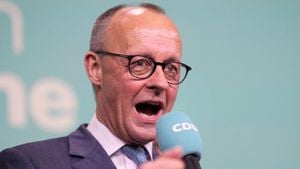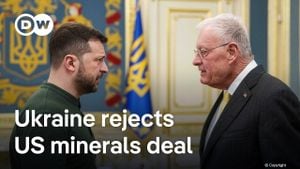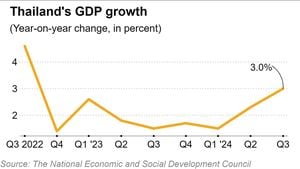Germany's recent federal elections have dramatically reshaped its political terrain, leading to the ascendance of far-right and far-left parties and fostering uncertainty for smaller political entities. On February 23, millions of Germans cast their votes, with an impressive turnout of 82.5%, which is among the highest since reunification. According to preliminary reports, the Christian Democratic Union (CDU), led by Friedrich Merz, has emerged as the largest party, securing approximately 28.6% of the vote. This marks both a recovery from the previous elections and the beginning of complex coalition negotiations.
Notably, the far-right Alternative für Deutschland (AfD) made significant strides, capturing 20.8% of the votes, translating to 152 seats, its best result to date. "The people have voted for change," remarked Alice Weidel, the party’s leader, affirming the AfD's growing acceptance within the German political fold.
Meanwhile, the governing parties faced disarray. The Social Democratic Party (SPD), led by current Chancellor Olaf Scholz, saw their vote share plummet to 16.4%, the lowest since World War II. Faced with the severe backlash, Scholz has stated he will not lead the coalition negotiations and accepts responsibility for the party's disappointing performance.
The CDU/CSU’s success means they will likely seek alliances to form the next government. A practical coalition seems necessary, as no single party achieved the absolute majority of seats required for governance. The CDU has ruled out aligning with the AfD due to significant ideological discrepancies. Instead, discussions around re-establishing ties with the SPD have gained traction.
This potential move toward another grand coalition may prove contentious, as both parties have historically held opposing views on numerous issues. The SPD, along with the Greens and the Free Democratic Party (FDP), previously governed together but fell apart last November, leading to these elections.
While the AfD and the far-left Die Linke gained ground, with the latter securing 8.8%, the FDP failed to surpass the 5% threshold, ending their tenure and signaling the need for significant reforms as voiced by their leader Christian Lindner.
The political atmosphere post-election reflects Germany's desire for stability amid pressing global challenges. With Friedrich Merz poised to be the next Chancellor, he faces the urgency to build coalitions quickly. "We need German leadership again," stressed Jens Spahn, Vice President of the CDU parliamentary group. The shifting power dynamics could lead to intensified negotiations as parties explore potential coalitions.
Market reactions have been optimistic following the elections, with the Frankfurt stock exchange experiencing notable gains. Investors are responding favorably to the prospects of stability, anticipating more decisive economic strategies under the CDU’s leadership. Merz has committed to engaging with key international leaders, ensuring Germany resumes its role as a stabilizing force within Europe. The electoral shift exemplifies how substantial portions of the electorate are now served increasingly by parties outside the traditional center, as indicated by the rise of the AfD and the strengthening of the left.
Political pundits speculate on whether the CDU will form alliances solely with the SPD or if negotiations will expand to include the Greens, which Merz historically dismissed amid campaign rhetoric. The essence of German governance appears likely to pivot toward partnerships, with parties adapting to shifting public sentiments.
Overall, as Germany moves forward from these elections, the key challenges will center around forming coalitions capable of sustaining governance, maintaining stability, and taking decisive action on pressing issues such as the economy, migration, and climate policy. With no clear path and multiple factions involved, the formation of the next government could take longer than expected.



